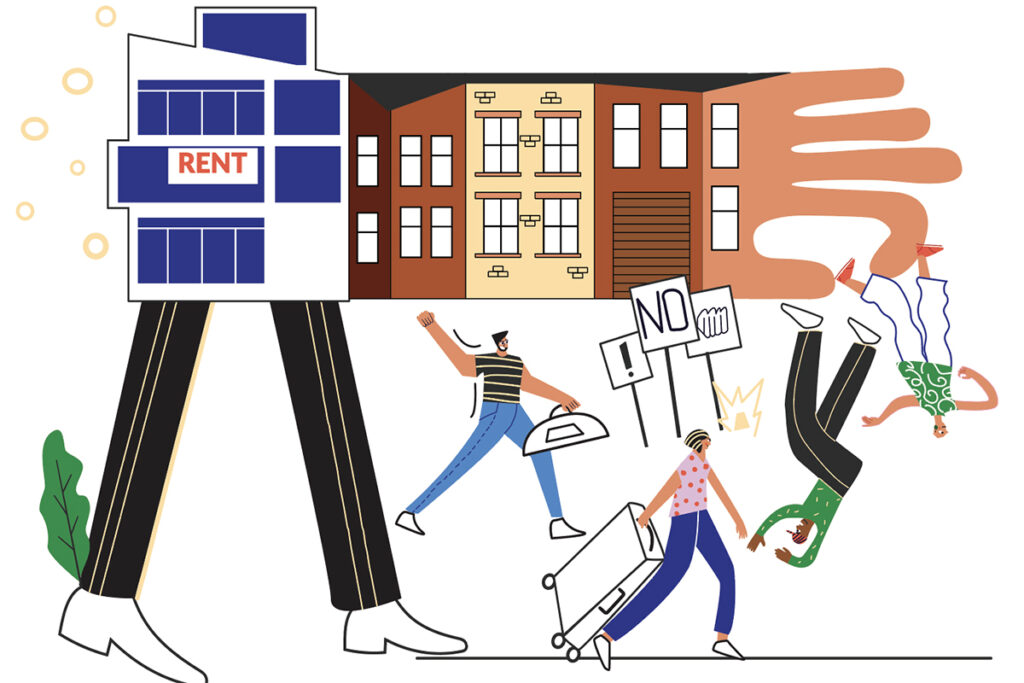Kansas City Area Transportation Authority meetings are usually small, sedate affairs, but that wasn’t the case at a February meeting, when a group of Midtown residents, labor unionists and tenants rights activists showed up and successfully blocked a developer from receiving tax incentives for the second time.
Forming a united front and armed with signs and T-shirts, the group demonstrated its opposition to developer Mac Properties’ request for a fifteen-year tax abatement of seventy-five percent for a project at Main and Armour. This wasn’t the first time this group of activists has battled the developer of luxury apartment complexes over tax incentives.
In the fall of 2022, Mac was looking to receive tax breaks from the Planned Industrial Expansion Authority, which is an incentive agency through the Kansas City Economic Development Corporation.
To receive those subsidies, Mac was required to follow the city’s set-aside ordinances, which required developers to set aside twenty percent of their housing units as affordable for people who are earning sixty percent of the median family income. The remaining units can be sold at market rate.
However, Gabe Coppage, a leading activist with the local tenants union, says, “our city’s definition of ‘affordability’ allows for a $1,200 one-bedroom apartment to be affordable.”
Mac’s proposal sparked a lot of energy from local Midtown homeowners and tenants. Midtown Tenant Union, a neighborhood chapter of emerging political powerhouse KC Tenants, was formed to take on a campaign against Mac’s proposal in 2022.
The group says it first approached Peter Cassel, the company’s community liaison, presenting a list of demands for more truly affordable units and asking the company not request a tax abatement through the city. However, Coppage says that the group did not receive an offer to negotiate.
Mac Properties develops luxury apartment complexes in Kansas City, St. Louis and Chicago. To activists, though, they are the leading gentrifier in Midtown and seen as responsible for displacing hundreds of Kansas City residents since their first development in 2007.
Mac already has a large presence on Armour Boulevard. “Since they have come here, in a span of ten years, the Black population has decreased by twenty-one percent, and it’s not a coincidence,” Coppage says.
After speaking with Cassel, the MTU felt determined to protect the $10.5 million Mac properties sought to use from an expiring Midtown tax increment financing fund. Believing there was a better use for the money, the MTU proposed redirecting the money into the city’s Affordable Housing Trust Fund, which promotes and builds long-term affordable housing.
The City Council ultimately denied Mac Properties’ proposal, citing Mac’s historical displacement of Midtown residents. This decision marked a big win for the tenants union. However, the victory was short-lived.
Now, the MTU is facing off with Mac Properties again to protect the Main and Armour corner. Mac Properties revived their Main and Armour proposal with fewer units—all at market price—and sought a fifteen-year tax abatement of seventy-five percent from RideKC, even though City Council already denied Mac’s request. RideKC is an incentive company that endorses and aids transit-oriented developments. “The southwest corner of Armour and Main is one of the best sites in Midtown,” Cassel says, due to the walkability of the location and Streetcar access.
Now, with the development of a new Royals stadium and freeway, the question remains how KC Tenants and the MTU will continue to preserve their neighborhoods as developers set their sights on Kansas City.
Coppage makes it clear that the tenant union is not anti-development. “We’re anti-getting-priced-out-of-our-neighborhood,” he says.
According to Coppage, there is no lack of luxury housing in Kansas City. There is only a lack of truly affordable housing. He believes developers catering to that need should be the ones receiving public incentives.
The fight between MTU and Mac Properties is only one battle in a much larger turf war between big developments and anti-gentrification groups.
The MTU wants to expose the many avenues and loopholes that developers use to get financing from the city, Coppage says. KCATA has not addressed these loopholes, and housing activists are questioning the group’s role in granting incentives to companies already denied by the city.
The MTU believes neighborhood constituents should have a say in how their taxes are spent in order to protect their neighborhoods.





